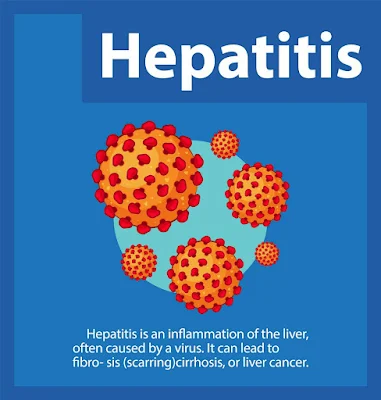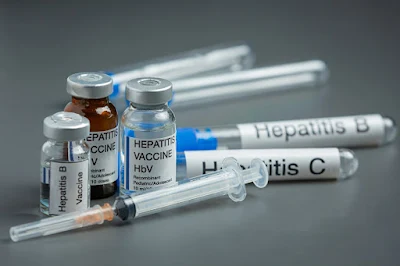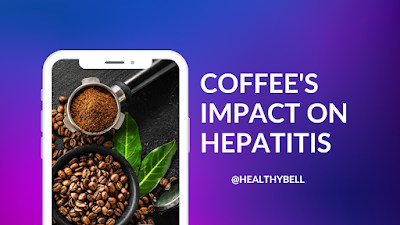Harnessing Hope: Breakthroughs in Hepatitis Treatment and the Surprising Role of Coffee in Battling Hepatitis B and D
In the realm of medical breakthroughs, hope shines bright for those battling hepatitis B and D, with a surprising ally joining the fight – coffee. As researchers delve deeper into the intricate world of hepatitis treatment, the discovery of the potential positive impact of coffee on these conditions has sparked a new wave of optimism. The latest findings not only offer valuable insights into innovative treatment approaches but also open up intriguing possibilities for harnessing the power of everyday consumables in combating these persistent diseases.
 |
| Image Credit Goes to freepik |
In this article, we will explore the groundbreaking advancements in hepatitis treatment, shedding light on the surprising correlation between coffee consumption and improved health outcomes for hepatitis B and D patients. As we uncover the fascinating synergy between medical science and everyday beverages, prepare to be captivated by the remarkable strides being made in the battle against hepatitis. Join us on this insightful journey as we uncover the untold story of how a simple cup of coffee could hold the key to transforming the landscape of hepatitis treatment.
Understanding Hepatitis: Types and Impact
Hepatitis is a group of viral infections that affect the liver and can lead to significant health complications if left untreated. Hepatitis B and D are particularly challenging due to their chronic and persistent nature. Patients with these forms of hepatitis often face long-term health concerns and require ongoing management to prevent further liver damage. The impact of hepatitis on individuals and communities is profound, highlighting the urgent need for effective treatment options and supportive care.
The traditional approaches to hepatitis treatment have primarily focused on antiviral medications and lifestyle modifications. While these interventions have been valuable in managing the conditions, researchers have been tirelessly exploring new avenues to enhance treatment outcomes and improve the quality of life for patients. The emergence of breakthroughs in hepatitis treatment represents a beacon of hope for those affected, offering renewed optimism and the promise of transformative therapies.
Breakthroughs in Hepatitis Treatment
Recent years have witnessed significant strides in the development of novel treatment strategies for hepatitis B and D. From advanced antiviral therapies to innovative immunomodulatory approaches, the landscape of hepatitis treatment has been evolving at a remarkable pace. The advent of precision medicine and personalized treatment regimens has ushered in a new era of tailored interventions, aiming to address the unique characteristics of each patient's condition and optimize therapeutic outcomes.
 |
| Image Credit Goes to freepik |
The integration of cutting-edge technologies, such as gene editing and RNA interference, has further expanded the therapeutic arsenal against hepatitis. These groundbreaking advancements hold the potential to not only suppress viral replication but also stimulate the immune system's ability to combat the infection more effectively. As clinical trials continue to unveil promising results, the future of hepatitis treatment appears increasingly promising, offering new avenues for patients to regain control of their health and well-being.
The Surprising Role of Coffee in Battling Hepatitis B and D
Amidst the ongoing quest for innovative hepatitis treatments, an unexpected contender has emerged in the form of coffee. Recent research has revealed intriguing associations between coffee consumption and improved health outcomes for individuals with hepatitis B and D. While the notion of coffee as a complementary therapy may seem unconventional, the scientific evidence supporting its potential benefits has captivated the medical community and prompted further exploration into its mechanisms of action.
 |
| Image Credit Goes to freepik |
The discovery of coffee's potential impact on hepatitis has sparked curiosity and enthusiasm, as it offers a non-invasive and readily accessible avenue for enhancing treatment outcomes. With its widespread availability and established cultural significance, coffee presents a unique opportunity to integrate everyday consumables into holistic treatment plans for hepatitis patients. As researchers delve deeper into the molecular pathways influenced by coffee consumption, the prospect of leveraging this ubiquitous beverage as a supportive agent in hepatitis management continues to garner attention and interest.
Benefits of Coffee in Hepatitis Treatment
The potential benefits of coffee in hepatitis treatment extend beyond mere speculation, as empirical evidence has begun to unveil its diverse physiological effects. Studies have indicated that regular coffee consumption may be associated with reduced liver fibrosis, inflammation, and disease progression in individuals with hepatitis B and D. The bioactive compounds present in coffee, including caffeine and polyphenols, have been implicated in modulating key pathways involved in liver health and immune function.
 |
| Image Credit Goes to freepik |
Furthermore, coffee's antioxidant properties and potential anti-inflammatory effects have been postulated to contribute to its favorable impact on liver health. The intricate interplay between coffee components and cellular signaling pathways underscores the multifaceted nature of its potential benefits, shedding light on the complex mechanisms through which coffee may exert protective effects against hepatitis-related complications. The emerging understanding of coffee's role in liver health has ignited optimism and paved the way for exploring its integration into comprehensive hepatitis treatment approaches.
Research and Studies on Coffee's Impact on Hepatitis
The scientific inquiry into coffee's impact on hepatitis has culminated in a growing body of research that seeks to elucidate the underlying mechanisms and clinical implications of this intriguing relationship. Epidemiological studies have consistently highlighted the inverse association between coffee consumption and the risk of liver disease progression in hepatitis patients, prompting investigators to delve into the molecular underpinnings of this phenomenon. Through in vitro experiments and animal models, researchers have unveiled potential pathways through which coffee constituents may exert protective effects on liver cells and immune responses.
 |
| Image Credit Goes to freepik |
Moreover, clinical trials evaluating the effects of coffee consumption on hepatitis-related outcomes have yielded compelling findings, demonstrating correlations between coffee intake and favorable changes in liver function markers, viral load, and disease severity. The cumulative evidence from diverse research endeavors has underscored the potential of coffee as a modifiable factor that may influence the trajectory of hepatitis progression, offering a novel perspective on the interplay between dietary habits and disease management.
Incorporating Coffee into Hepatitis Treatment Plans
The evolving understanding of coffee's potential benefits in hepatitis treatment has prompted discussions about its integration into comprehensive care plans for affected individuals. Healthcare providers are increasingly considering the inclusion of coffee as part of dietary recommendations tailored to hepatitis patients, leveraging its purported hepatoprotective properties and potential impact on treatment outcomes. By incorporating coffee within the framework of holistic care, clinicians aim to empower patients with additional tools to support their liver health and overall well-being.
The personalized approach to incorporating coffee into hepatitis treatment plans emphasizes the importance of individualized recommendations that account for patients' unique medical histories, nutritional needs, and lifestyle preferences. Collaborative discussions between healthcare professionals and patients regarding the potential role of coffee in their care allow for informed decision-making and the cultivation of supportive partnerships that prioritize patient-centered outcomes. As coffee assumes a newfound significance in the realm of hepatitis management, its inclusion within the spectrum of therapeutic interventions exemplifies the evolving landscape of integrative medicine.
Coffee as a Complementary Therapy for Hepatitis B and D
The concept of coffee as a complementary therapy for hepatitis B and D underscores the dynamic intersection of traditional medical interventions and lifestyle-based approaches. While antiviral medications and immunomodulatory therapies remain pivotal in the management of hepatitis, the adjunctive role of coffee as a supportive agent introduces a paradigm shift in the comprehensive care paradigm. By harnessing the potential synergies between conventional treatments and lifestyle modifications, healthcare providers seek to optimize the holistic well-being of patients and promote resilience against the challenges posed by chronic hepatitis.
 |
| Image Credit Goes to freepik |
The integration of coffee as a complementary therapy aligns with the broader ethos of patient-centered care, emphasizing the empowerment of individuals in managing their health journey. Through informed guidance and evidence-based recommendations, patients are encouraged to explore the potential benefits of incorporating coffee into their daily routines, recognizing its role as a modifiable factor that may exert favorable influences on liver health and disease progression. As the concept of complementary therapies continues to gain traction within the healthcare landscape, the inclusion of coffee as a supportive element in hepatitis management exemplifies the convergence of innovative perspectives and established practices.
Lifestyle Changes and Dietary Recommendations for Hepatitis Patients
In addition to the potential role of coffee in hepatitis treatment, the broader emphasis on lifestyle changes and dietary recommendations holds profound implications for individuals navigating the complexities of chronic hepatitis. Comprehensive care plans for hepatitis patients encompass a spectrum of considerations, including nutritional optimization, physical activity, stress management, and avoidance of harmful substances. The integration of holistic lifestyle modifications serves as a cornerstone of empowering patients to cultivate resilience and promote liver health amidst the challenges posed by hepatitis.
 |
| Image Credit Goes to freepik |
Healthcare providers play a pivotal role in guiding patients towards lifestyle changes that align with their unique needs and goals, fostering a collaborative approach to holistic well-being. By engaging in meaningful discussions and providing tailored resources, clinicians empower patients to make informed choices that support their liver health and overall quality of life. The cultivation of a supportive ecosystem that prioritizes the integration of lifestyle modifications alongside medical interventions exemplifies the multifaceted nature of comprehensive hepatitis care, emphasizing the interconnectedness of diverse factors in shaping therapeutic outcomes.
Support and Resources for Hepatitis Patients
Navigating the journey of living with hepatitis necessitates access to robust support systems and valuable resources that empower individuals to confront the challenges posed by these conditions. From educational materials and peer support networks to advocacy initiatives and specialized care programs, the landscape of support and resources for hepatitis patients continues to evolve, aiming to address the multifaceted needs of individuals and communities affected by these conditions. The provision of comprehensive support acknowledges the nuanced impact of hepatitis on various aspects of patients' lives, encompassing physical, emotional, and social dimensions.
Empowering patients with access to supportive resources fosters resilience and promotes a sense of community, anchoring individuals in a network of understanding and shared experiences. By championing initiatives that prioritize the holistic well-being of hepatitis patients, healthcare providers and advocacy organizations contribute to the cultivation of an inclusive ecosystem that celebrates hope, resilience, and progress. The collaborative efforts aimed at enhancing support and resources for hepatitis patients reflect a commitment to nurturing compassionate and empowering environments that enable individuals to thrive amidst the complexities of chronic health conditions.
Conclusion: Embracing Hope and Progress in Hepatitis Treatment
As the landscape of hepatitis treatment continues to evolve, the convergence of groundbreaking advancements and innovative perspectives heralds a new chapter in the journey towards combating these persistent conditions. The discovery of coffee's potential impact on hepatitis B and D exemplifies the remarkable synergy between medical science and everyday consumables, offering a glimpse into the transformative potential of holistic treatment approaches. By harnessing the power of hope, innovation, and collaboration, the medical community and individuals affected by hepatitis unite in a shared pursuit of resilience, empowerment, and improved health outcomes.
The unfolding narrative of breakthroughs in hepatitis treatment and the surprising role of coffee serves as a testament to the enduring spirit of optimism and the boundless possibilities that emerge from the intersection of science and everyday experiences. As we embrace the promise of progress and the untold potential of unconventional allies in the fight against hepatitis, we stand poised at the threshold of a future defined by resilience, hope, and the relentless pursuit of transformative solutions. Together, we embark on a journey illuminated by the enduring beacon of hope, uniting in our collective endeavor to harness the power of innovation and unwavering determination in the battle against hepatitis.
Comments
Post a Comment